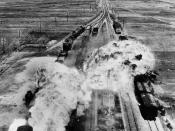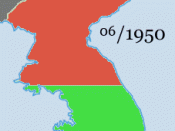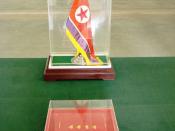There have been many debates made as to who made the first initial attack in the Korean War in 1950 - 1953. This investigation outlines the views of North and South Korea, as well as the political and militarily factors that influenced both sides into their biases and decisions. This investigation will also outline the origins of the conflict and the intent of both sides. All factors that influence both sides will then be analyzed, particularly those of the South and how they contradict the views of the North. In this essay I have used the sources Echoes of the Korean War, History of Nations: North Korea, and The Korean War: no victors, no vanquished.
Summary of Evidence
Korea had been colonized by Japan since the early twentieth century, and after Japan's defeat in World War 2 on August 15, 1945(1), Korea was liberated from Japanese control. As result after Korea liberation from Japan, the United States and the Soviet Union occupied the area and set up two regimes separating the North from the South at the 38th parallel.
This division between the North and South was actually just an ideological division between communist Soviet Union and capitalist United States. This was the basis and origin of the Korean War that would only separate the North and South even farther apart from each other.
Because Korea was ruled for so long but outside powers, both sides wanted an independent reunified country void of outside influence. However after their liberation from the Japanese, regimes had already been forced upon them putting each side in it's own bias and view of how the country should be reunified and under what regime. The South led by Syngman Rhee, supported by the United States, and the North led by popular war hero Kim Il Song, supported by the Soviet Union.
In 1949, the Soviet Union and United States withdrew their troops from Korea as agreed by both powers and the two Koreas now exposed to opportunity to take action towards reunification. From early 1949 several small quarrels had occurred along the 38th parallel between both sides and showed the two sides wanted reunification on their own terms . On June 25th, 1950, the first initial attack was made igniting the Korean War.
North Korea still believes to this day that the South attacked first, because as stated in "Echoes of the Korean War", that before United States Special Envoy John Foster Dulles had visited South Korea on June 20th 1950, president Syngman Rhee gave special instructions to ambassador Chang Myon in Washington to visit Dulles. He had asked that South Korea have guaranteed United States protection from military attack and that the United States had agreed and included Korea in its Far Eastern defense line (3). Therefore with United States backing this gave South Korea the initiative to make a bombardment on North Korea on June 23rd 1950.
North Korea's statement can be contradicted however because as stated in "The Cold War" and "History of Nations: North Korea", that in January 1950 the United States Secretary of State Dean Acheson had implied in a National Press Club address stated that the United States Far Eastern Policy considered Korea to be outside of its defense perimeter. Therefore when Syngman Rhee has asked US Special Envoy John Foster Dulles for help from the United States, Rhee was disappointed with no promises made to help protect South Korea against military attack. This can justify that South Korea's vulnerability due to it's poorly trained and under-prepared army and North Korea's superiorly trained army by Soviet Union advisors and most importantly backing from the Soviet Union and Communist China gave North Korea the initiative motive and intention to attack and attempt to reunify the country under a communist regime.
Evaluation of Sources
1.Korotkov, G.I., et al. Echoes of the Korean War. Pyongyang, Korea:
Foreign Languages House, 1996.
G. I.Korotkov is a Doctor of History, Professor and honorary member of Military Institute of the Academy of Sciences of Russia. This book written as well by many other historians, political scientists, noted political and military figures of the Commonwealth of Independent States is translated into English as propaganda to show the communist's point of view upon the war. This can be seen as a reliable source since most books on the Korean War are based in Western mentality with biases as to how North Korea views these past events. It gives a direct insight from another perspective providing facts, dates and quotes from actual events of the time and other sources of information unavailable to western states, such as Chinese and Russian documents. This source is limited however because it is written and comes directly from the North Korean government, because it is used for propaganda, the aim of this source is to try to convince or sell and idea to the reader that will benefit North Korea.
2. Miller, Debra A. The History of Nations: North Korea. Farmington Hills,
MI: Greenhaven Press, 2004.
Greenhaven Press's History of Nations, based in the United States, is part of a series that tells the story of various countries through the use of primary and secondary sources. It is a very new and up to date source used for students of international history. This source is very reliable because it is very new it contains the newest information and facts known to date. The focus of this source is concentrated on having the least bias view upon the Korean War using its up to date information. However this source is still limited because in the United States people have a natural bias towards what happened in the conflict.
Analysis
June 25 1950 was a very strategically planned day for the North Koreans. The accepted fact is that North Korea had invaded South Korea, however in 1952, an "independent" journalist, I F. Stone had saidthe accepted fact was wrong and that South Korea had actually invaded the North, or at least, that the North Korean invasion was an exasperated response to South Korea's provocation and cross border attacks .
However with today's new evidence we know that Kim Il Sung had been asking for support from Soviet Union leader Joseph Stalin and Communist China leader Mao Ze Dong for an invasion upon South Korea since 1949 .
The support to reunify Korea with force from Stalin took Kim Il Sung nearly a year of pleading. Kim Il Sung would need the Soviet Union support since at the time North Korea was not capable of setting such a massive campaign on its own. Stalin only agreed to give support because the Soviet Union had believed if North Korea were to invade, the United States would not take action or become involved militarily. Stalin was determined to avoid military confrontation with the United States because as stated in "The Korean War", The Soviet Union had assumed Japan would rearm and threaten the Soviet Far East. He wanted to gain control over southern Korea in order to ensure that Japan could not again use the peninsula as a staging ground, as it had for invasions of the Soviet Union after the Bolshevik Revolution of 1917 and of China in 1930(6). This can understood because that year through Soviet Union intelligence and speeches by American policy makers such as John Foster Dulles and Dean Acheson stated that the United States does not consider Korea to be part of its Far Eastern defense line. Stalin based his foreign policy around American strength and commitment; he would never fail to consider a United States failure to come to South Korea's defense.
With the assurance that the United States would not get involved in a conflict in Korea, the Soviet Union and North Korea had clear grounds to begin a plan for invasion and had it completed by June 1950, it was set for launch on the 25th of June.
North Korea's claim that the South had made the first attack is totally contradicted by the evidence above because South Korea had thought it would receive no aid from the United States. Though is it true Syngman Rhee had made many statements to use force to reunify the country, such as " We must put an end to Korea's partition before the Chinese communists consolidate their power. Otherwise, international communism will be able to attain superiority in the cold war", Syngman Rhee was no position to take such action because of the weakness of his position.
In the book "Echoes of the Korean War", it states that Rhee was "Ready to attack communist North Korea, and the United States would aid to him through the United Nations. However, he advised Rhee to fabricate the story that South Korea had been invaded first and to make up an action programme on that basis. However as the stated above, the US had clearly stated they would not give support, also The United States still took personal action with the UN two days after the event.
Conclusion
North Korea's initiative to make the first attack can be seen as reasonable though they themselves claim they did not make the first strike. North Korea's initial attack cannot be fully blamed or reasoned by North Korea themselves because of influences such as the Soviet Union, miss understanding of intentions between the communist and capitalist and hatred between the two regimes of greater powers. Due to outside factors such as political and military, North and South Korea have been separated and still remain far from resolve because of the lack of compromise and acceptance as to how to resolve the conflict.
Bibliography
Grishanov, V M., et al. Echoes of the Korean War. Pyongyang, Korea: Forgein
Languages House, 1996.
Miller, Debra A. The History of Nations : North Korea. Farmington Hills, MI:
Greenhaven P, 2004.
Phillips, Steve. The Cold War. Halley Court, Jordan Hill, Oxford: Heinemann
Educational, 2001. 68-77
Sandler, Stanley. The Korean War: No Victors No Vanquished. Lexington Kentucky: The
UP of Kentucky, 1999.Word Count: 1,609


